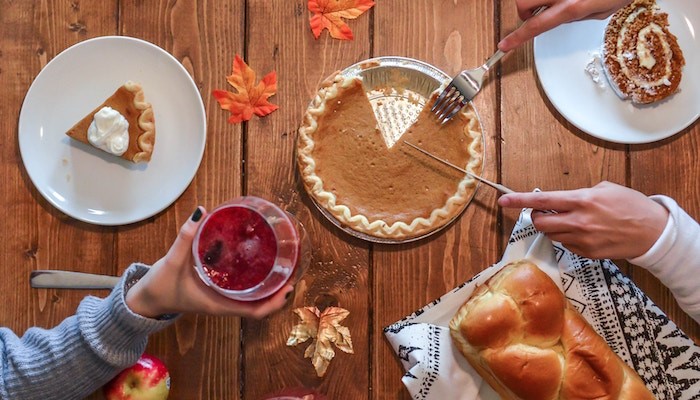
We can pack so much into a Thanksgiving dinner that instead of the food reviving us, we often find it saps us of our energy and leaves us feeling like a bed of sloths. But just because our traditions dictate a large and decadent meal doesn’t mean we have to blindly follow along and feel depleted afterward.
There are a lot of little tricks that can make you feel better, physically and mentally throughout Thanksgiving Day. Read on for some of our favorites below:
1. Eat Breakfast
It’s general knowledge that “saving room” all day for a meal will often result in overeating, but for some reason, this logic escapes us on Thanksgiving. When we fast before Thanksgiving dinner, not only will we likely overeat, but we will overeat with foods that are both intensely filling and high in carbohydrates, which both multiply our post-meal exhaustion.
Instead, treat the day like any other and have a normal breakfast. You’ll be tide over until the main event and because you have already digested some nutrients, you’ll be more likely to eat a more balanced, satisfying Thanksgiving meal.
2. Drink Water
Drinking a glass of water an hour or so before a big meal is always a best practice. When we are dehydrated, our bodies sometimes confuse its need for water for hunger. Compound this with the fact that we’re already looking forward to a lavish meal (and maybe a cocktail or two), and we set our minds and bodies in a prime position for overeating.
And drinking water does far more good for the body than simply satisfying thirst. One recent study found that drinking water before meals can help with weight loss, simply through appetite control. Others claim that drinking a glass of water before a meal can aid in digestion. While more research on this is needed, one thing is clear, water can do us nothing but good.
3. Spur Conversation
Conversation at the dinner table is important. Not only does it create a sense of togetherness and ritual, but it also helps you pace yourself. Simply put: the more we talk, the slower we eat.
Put your fork down every few bites, and take a few deep breaths. Doing so gives our blood sugar levels more time to rise, which helps our bodies accurately register when we’re full. Studies from Harvard Medical School confirm that eating slowly helps us to feel fuller faster, and conversation is a great and easy way to slow down the consumption of your meal in a pleasant way. Just don’t let the conversation drift toward certain topics—we’re trying to eliminate stress, after all!
4. Lie Down
This is not a green light for a post-dinner nap (which will actually make you feel much more sluggish). Instead, take ten minutes after dinner to lie down on your left side.
This old Ayurvedic trick makes sense when you break it down: our stomachs are on the left side of our bodies, and so lying on our left side allows our stomachs to hang naturally, which helps us digest the food we’ve eaten. An old competition eating trick is also to stand up immediately after eating and wiggle around. But while that may make room for more food, it actually pulls food down before it’s fully digested, which leaves us feeling full, bloated and gaseous.
If you’re dining with the Queen and don’t feel comfortable sprawling out on the ground, you’ll experience similar benefits if you make a point to sleep on your left side that night.
5. Get Moving
After lounging around for ten minutes, getting the body moving is always a good call. According to multiple studies, going for a brief walk after eating has been shown to accelerate digestion and improve blood sugar levels. If you can’t get out of the house for a walk, you can make a point to help with cleanup around the kitchen. Not only will you please the dinner host with your manners, you’ll also be getting your body moving in helpful ways.
You can also opt to stretch or practice some gentle yoga poses. There is no need to make things difficult or complicated—basic poses with intentional breathing were found to improve digestion and increase “feel-good” hormones like serotonin and oxytocin, meaning you’ll be happier and more relaxed.
At the very least, rub your belly. No, really. Studies show it can improve blood flow, which will help with digestion, and especially constipation.
6. Recalibrate
The morning after Thanksgiving is crucial. Are you going to march downstairs and have a turkey, stuffing and gravy scramble for breakfast? Or is today the day you find yourself motivated to start eating healthier and exercising more often?
Use Friday morning to assess how you feel, how you want to feel, and how you want to end your year. After all, when we feel healthy and energized, we accomplish more and get closer to our ONE Thing.
Choosing to live a better lifestyle doesn’t mean you have to throw away all of your leftovers. Pick one Thanksgiving item and incorporate it into a more balanced and nutrition packed meal. Even pumpkin pie can be added to oatmeal, turkey can be incorporated into a chili or soup, and stuffing can improve any hearty hash. Don’t be afraid to get creative.
Most importantly, enjoy your Thanksgiving, and if you slip up, keep in mind that it’s just one day. Hopefully these tips will have you up on Friday morning ready to hit the ground running. Happy Thanksgiving from all of us here at The ONE Thing. Enjoy time with family and loved ones, and remember to take care of yourself!
